A short film that can be watched in one breath. In less than twenty minutes, its authors comprehensively and vividly talk about how the Ukrainian media, in the conditions of large-scale Russian aggression, are looking for ways to survive, strengthen and acquire stability.
As Chernihiv journalist Olha Cherniakova says, when people are left without information, they get confused, panic, act recklessly, and therefore can die in war. Therefore, the role of journalists, information providers, is vital. Today, the information does save lives.
The film with the telling title “Information saves lives… Ukrainian media in search of sustainability” was prepared by the National Union of Journalists of Ukraine (NUJU) with the support of the Swiss non-profit organization Foundation Hirondelle and the Institute for Regional Media and Information (IRMI, Ukraine) as part of the project entitled Increasing The Ukrainian Media Sustainability, financed by Swiss Solidarity.
…The sound of a siren that turns into disturbing music. Shots of shelling, fires, and convoys of enemy vehicles advancing on Ukrainian cities and villages. Destroyed houses. Short shots of the frontline streets and journalists next to the military. Rallies with dozens of Ukrainian flags and one huge blue-yellow flag in people’s hands, stretching for several tens of meters…
And next to it is the building of the main office of the NUJU in Kyiv. Footage of people carrying and distributing the first issues of local newspapers after the occupation, and with them, the well-known newspaper We Are From Ukraine! published by the NUJU in cooperation with the All-Ukrainian Charitable Fund Journalist Initiative and with the financial support of the Japan Offspring Fund GREEN COOP in many regions of Ukraine. And the joy of people who receive a charge of faith that life will definitely get better…
NUJU President Sergiy Tomilenko, NUJU First Secretary Lina Kushch, and journalists tell how the Ukrainian media claim: “Journalists are important every day!” especially journalists are important in the conditions of terrible large-scale Russian aggression.
War in Ukraine. Information. Ukrainian media in search of truth
The opening frames of the film recreate the first day of the great war – February 24, 2022, in a few words of the head of NUJU, Serhiy Tomilenko: “Everyone was in shock, but we continued to hold online meetings, drew up some definite plans, some distribution of advice for the work of journalists during the war period.”
The words of NUJU First Secretary, Lina Kushch, remind us of the atmosphere in our country in those days: “My working day on February 24 began at six in the morning when we started calling journalists who were either in Kyiv or in the regions, asking what the situation was, what is happening there. That day, they worked full-time in the Union until eight in the evening. At that time, we did not know that literally a few hours would pass, not even a few days. A few hours and, the editor from Izium would be forced to urgently leave his hometown because the city would be under the threat of capture, and all journalists and public activists would be on the hit lists.
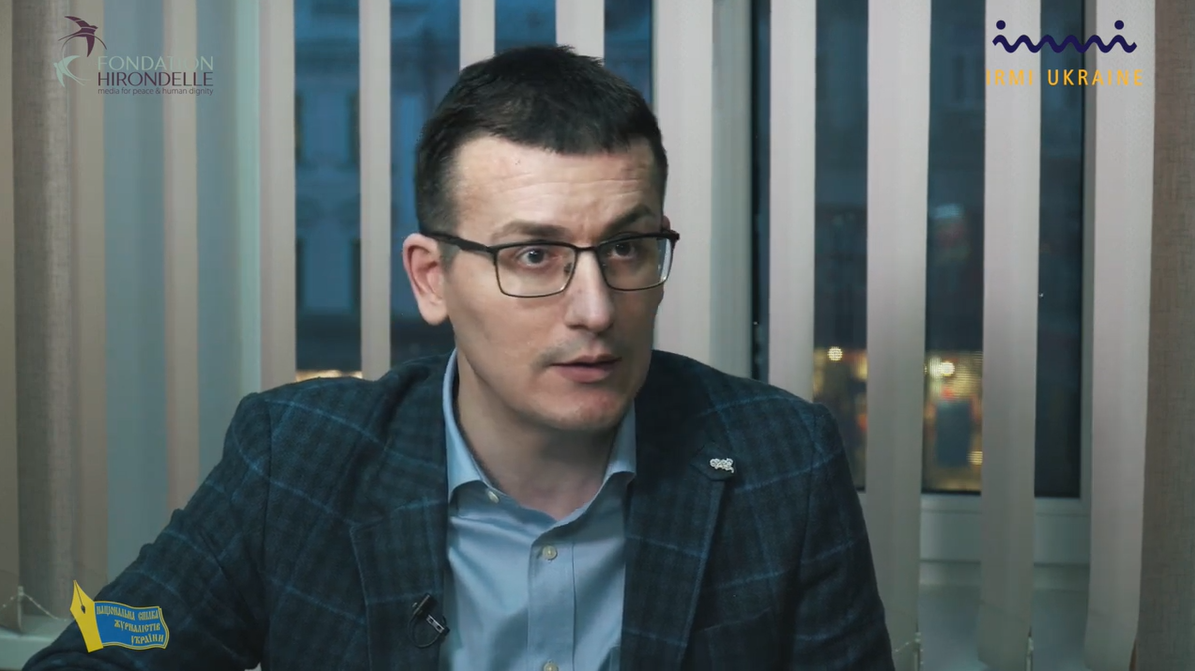
“From the first day,” says Sergiy Tomilenko, “we switched to a hotline mode to assist hundreds and thousands of journalists and media requests for various assistance. And this help is literally connected both with the survival of journalists and with the salvation of the media, and – the key – with the possibility that in the Ukrainian media space, journalists and the media have the strength to work, to fulfill the key mission of bringing the truth to their audience, and especially in the current conditions of Russia’s full-scale war against Ukraine. We see that the weight of objective information is more important than ever. It can save lives and unite Ukrainians to repel the occupiers and, accordingly, unite citizens to defend their country.”
A peculiar illustration of these words is the memory of those days of the responsible secretary of the Chernihiv NUJU‘s regional organization Olha Cherniakova: “When a city, a town, a village, or simply a person finds themself in an information blockade, they get confused, start to panic internally. A person should know where they are and what is happening to them. And this is where journalists are extremely needed.”
Editor-in-chief of the Kavun.City website, Ievheniya Virych from Kherson, who survived the horrors of the occupation and was forced to hide with her husband in order not to fall into the hands of the ruscists, has her memory and her emotions: “We worked in occupied Kherson, and now every time, when we meet with colleagues in Kyiv, Zaporizhzhia, Mykolayiv, Lutsk, and when events begin with the National Anthem of Ukraine, with our Ukrainian slogans, I remember how for such slogans and the performance of the National Anthem during the occupation, one could pay with one’s life. These were probably such “comings” from the occupation.”
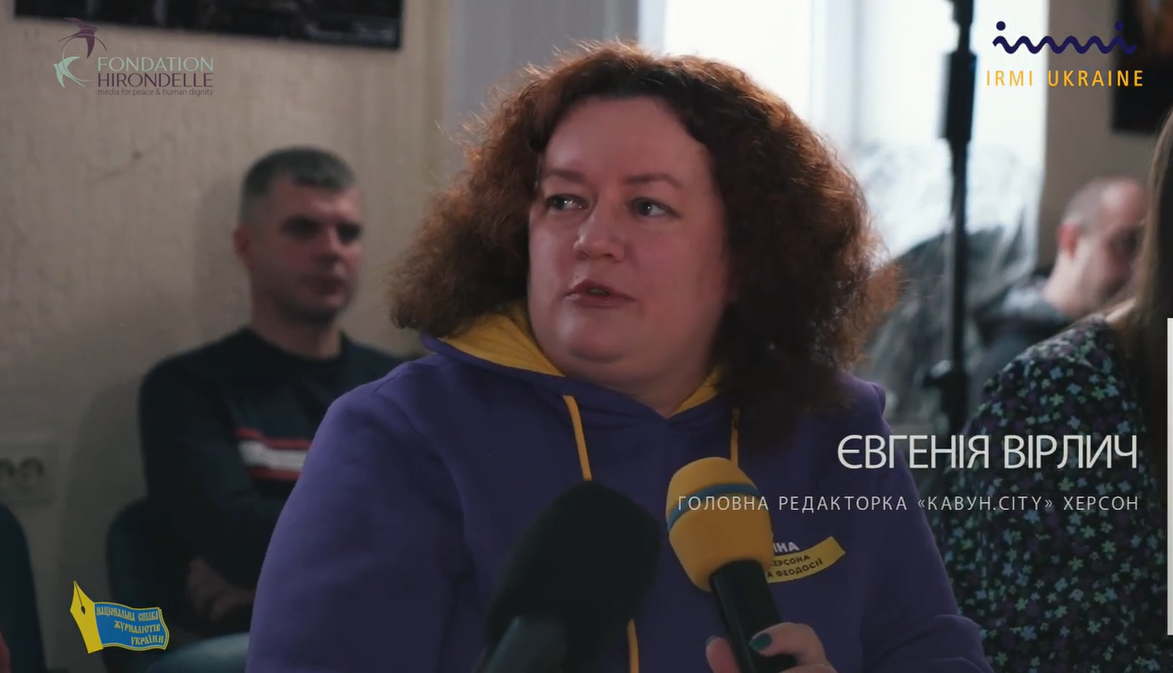
War in Ukraine. How journalists were rescued
At the front, the Ukrainian military repel enemy attacks and clean the streets of de-occupied cities. The war is gaining momentum; journalists are becoming its victims, along with all Ukrainians. They are one of the first on the list of the enemy to be massacred for their citizenship.
NUJU leadership understands this well, and the first thing they organize in the new working conditions is helping colleagues who remained in the occupation and those who became displaced.
Lina Kushch says: “For the first two months, everything went in the mode of a “fireteam,” when we simply “put out fires” that arose all day and night. These were requests from journalists who were in the occupied territories and did not know how to behave and simply did not know any security basics. These were requests from journalists who had already moved and were already displaced, but they either had no place to live or had no opportunity to work. They could not resume work, as all their property and equipment were lost.”
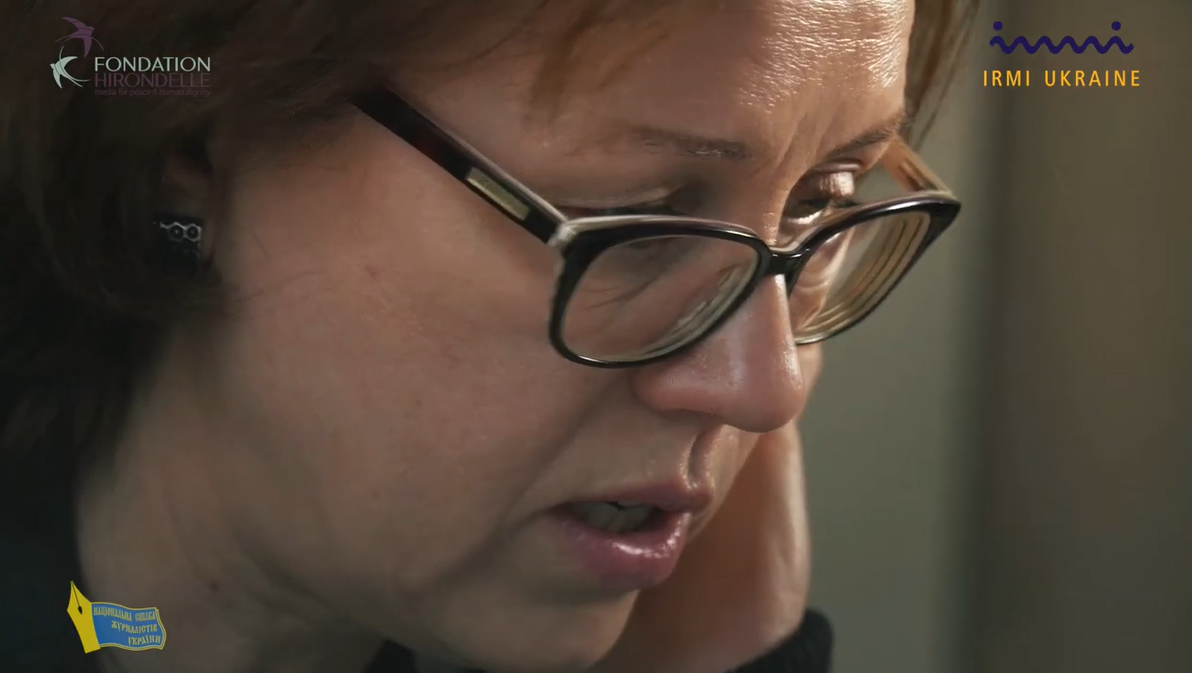
Sergiy Tomilenko adds to what has been said: “These were challenges: to make those decisions that were adequate in such a hot period, that were the most necessary. We did not have any chance to plan any very quiet events, and accordingly, again, in the hotline mode, we had to contact and did contact colleagues who were in the Kherson, Donetsk, and Luhansk Regions. Special aid projects were immediately deployed. In particular, assistance to Mariupol journalists. When Russia was shooting and destroying this besieged city, we provided maximum assistance to journalists fleeing Mariupol. We laid out routes and connections for them, provided some help, transferred money, passed on information about how our colleagues could save themselves and lobbied with individual international donors for a special emergency special funding program for Mariupol journalists. At that time, there was an attempt to occupy the Chernihiv Region. We immediately gave financial aid and protective equipment to twenty to thirty journalists from Chernihiv.”
Editor-in-chief of the Silski Novyny newspaper from the Kherson Region, Liubov Rudia, who, while remaining in the occupation, became an active volunteer and, as long as there was at least some opportunity, supported her compatriots, organized the delivery of products, clothes, and medicines. Now she is safe and has her memories: “When we were working in the occupation, I was touched when NUJU President Sergiy Tomilenko called me. When I looked at the phone (I have his number), I was very moved, even crying. And when he offered me to leave, I said then that I still have much to do there.”
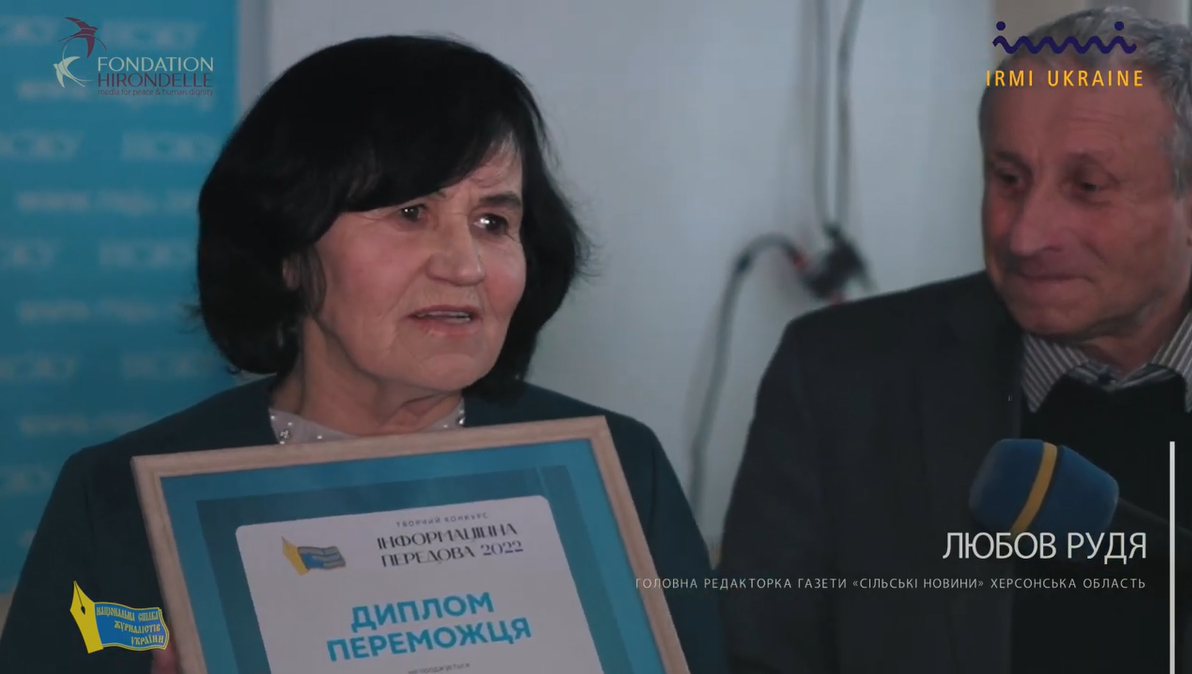
NUJU’s Journalists’ Solidarity Centers have become and remain a reliable support for Ukrainian journalists
Sergiy Tomilenko said that, based on the situation, it was decided to organize a special network of Journalists’ Solidarity Centers. He says: “At first, we created Journalists’ Solidarity Centers in three cities of Western Ukraine – in Ivano-Frankivsk, Chernivtsi, and Lviv, where there were already several employees who could be on the front line of contacts with journalists’ inquiries on a permanent basis.”
Lina Kushch took on a large share of organizational issues. Her experience as a person displaced from Donetsk in 2014 came in handy, but here she added responsibility for colleagues in challenging conditions of large-scale Russian aggression.
Lina Kushch recalls: “We had cases when journalists lived in shelters made from cafes, colleges, etc., and simply had no opportunities. They had neither equipment nor furniture. For example, to work, organize your workplace. If we talk about the areas of activity of the Journalists’ Solidarity Centers it is the area of security, assistance to journalists who have lost their jobs or want to resume this work, and assistance to editors in restoring it. And this is psychological and legal assistance, provision of a workplace, and provision of equipment for use.”
Sergiy Tomilenko adds: “This network became possible thanks to the support of the International and European Federations of Journalists and the global support of international partners. Now it is the working tool where fifteen employees work, whose every day begins and ends with a key challenge: Which journalists have we helped? Who else is in trouble? Who did we lend a helping hand to?’
Footage of people fleeing shelling, crossing checkpoints, holes shot through in the road sign saying Chernihiv and footage of houses destroyed by enemy rockets clearly show how timely and necessary such help was.
A year of war and a new life for newspapers
A large-scale war showed the value and significant demand for the work of professional journalists. Olha Cherniakova notes: “When Chernihiv was under an information blockade for one month, one week, and one day, people needed information about what was happening around them more than bread and medicine.”
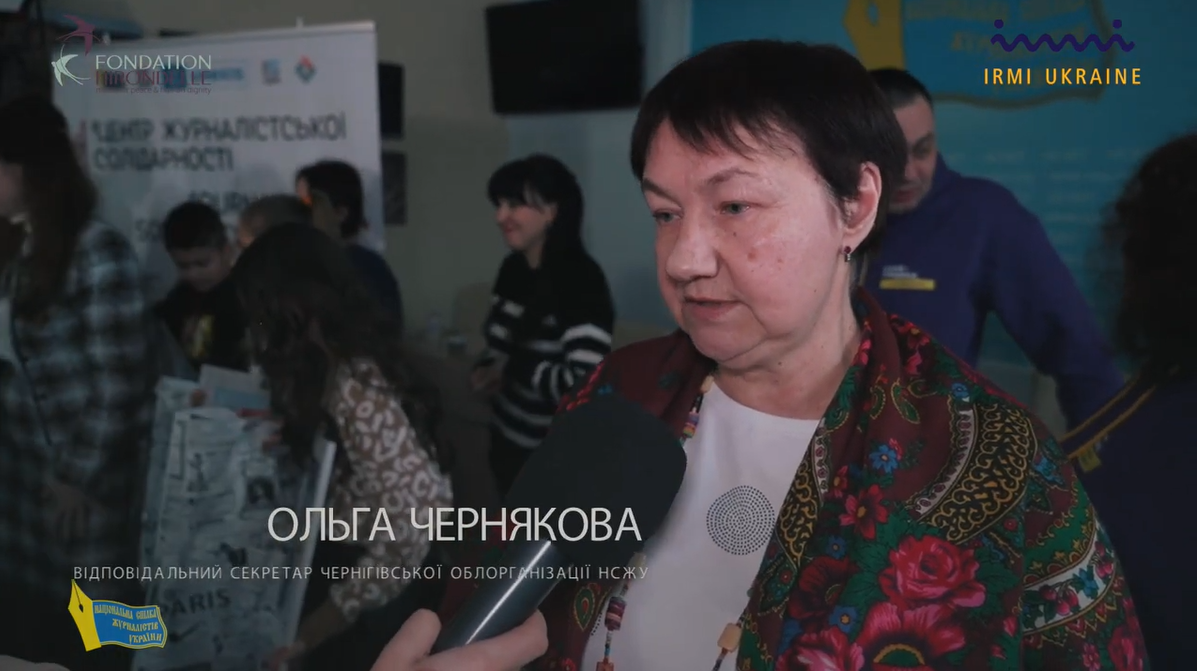
The leaders of the NUJU understood how important it is for people from the de-occupied territories to feel free, that life is returning and will gradually improve. And to help revive the feeling of freedom from the occupier and faith that everything will be fine. Maybe the local newspaper is a symbol of ordinary peaceful life…
Sergiy Tomilenko says: “Among our strategic initiatives is the revival of local newspapers in the de-occupied territories. As soon as Ukrainian troops liberate Ukrainian territories, we, as the NUJU, support local newspaper editors to publish the newspaper’s first issue after de-occupation. Occupiers are destroying the infrastructure in the de-occupied territories. First, there are problems with communication, problems with television communication, and mobile communication. Therefore, such a traditional channel of information dissemination as the printed press is ideal for inclusion in the Ukrainian information field.”
The editor of the Vorskla newspaper from Velyka Pysarivka, Sumy Region, Oleksii Pasiuha, using the example of his newspaper, felt how much the local press closest to the people is needed, which is a confirmation that people are remembered, information is shared with them so that it is easier for them to understand what is happening around and in Ukraine.
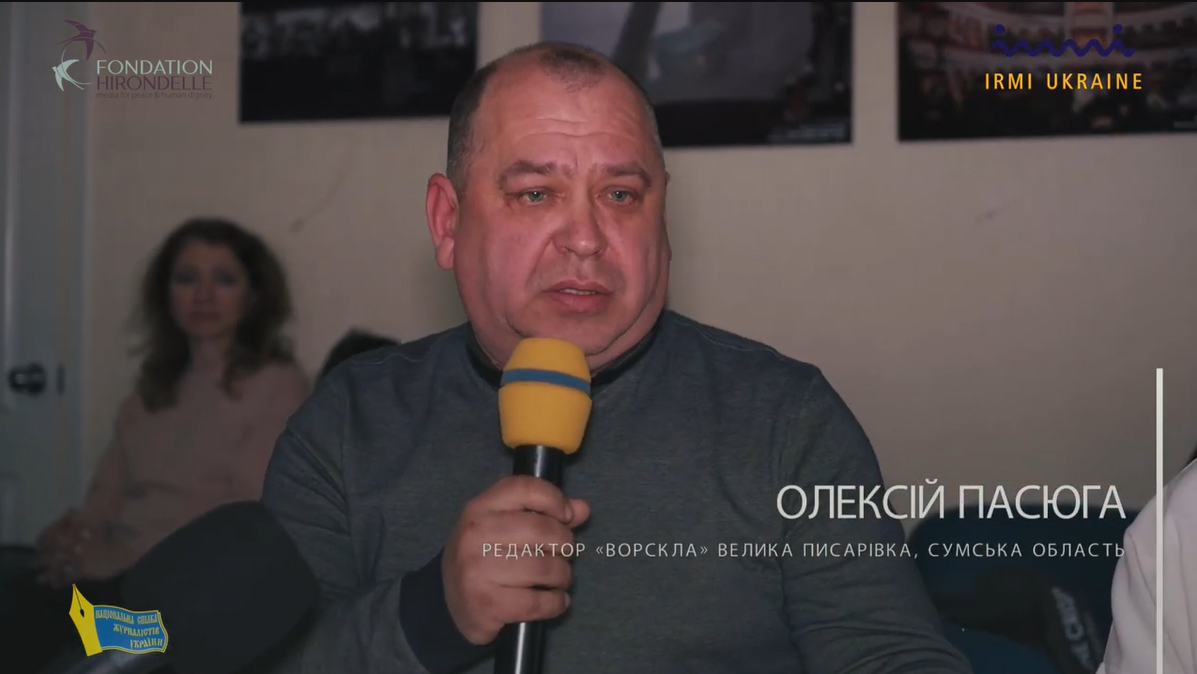
And when Oleksii Pasiuha says: “Our newspaper was not published for two months, but if I see now that newspapers are published that people did not receive for 10-9-8 months, and the Union made it so that they are published, I understand this joy. This is the best news for me, better than if I had seen maybe even some victory at the front. Because the ideological front is very important!” it is difficult to disagree with him. Tetiana Luchynska, the editor-in-chief of Mayak from Bohodukhiv, Kharkiv Region, is pleased: “When at the end of last year, the NUJU allocated funds to us to print an eight-page color newspaper, it was a real sensation for our readers.”
The footage, on which volunteers saying ‘Get your favorite newspaper!’ are giving out local newspapers and We Are From Ukraine! publications to the people who say ‘Come on, come on, come on, give it to us…’ in response, better than any other words, testifies to the thirst of the population for the accurate information provided from Ukraine.
NUJU has financed the resumption of newspapers publishing
According to Sergiy Tomilenko, the NUJU has financed the first or one of the first issues of more than 20 local newspapers in the de-occupied territories. These were mainly newspapers in the Kharkiv Region, Kherson Region, and Donetsk Region, but there also were several publications in the de-occupied Kyiv and Sumy Regions.
The NUJU President talks about the editors’ dedication and willingness to publish their newspapers despite challenging conditions when the newsroom feels supported:
“In my hands, I am holding an issue of the Vpered newspaper from Bakhmut, where fierce battles are occurring. The making of the newspaper is complicated. Now, editor-in-chief Svitlana Ovcharenko lives in Odesa. She has light for two or three hours a day. So, she uses these two to three hours a day to collect information, transfer it somewhere, and make a layout somewhere but still ensures the newspaper’s publishing.
As soon as our fellow editors, who have many years of experience, begin to believe in their strength, they publish newspapers in complicated conditions: being replaced persons, being separated from their homeland, having to look for new printing houses, new ways of distribution, etc.
They believe in their strength. As soon as the newspaper appears, they receive dozens upon dozens of excited reviews from their readers.
In fact, in every case, when a newspaper unseen by readers for a long time is published, we receive feedback saying that people merely kiss their favorite newspapers. It happens because, for them, newspaper means stability, which they have gotten used to for decades since childhood.
And when a well-known newspaper re-appears, it is a clear sign that Ukraine, Great Ukraine, is fighting for every little Ukrainian.”
The world with Ukraine. International partners
Sergiy Tomilenko tells:
“Every day, since the beginning of the full-scale invasion, we received and continue to receive many requests from our partners: “How can we help? In what way can we more effectively rescue Ukrainian journalists in trouble?”
First, I can mention the Lithuanian partners representing the Eastern European Research Center, the Lithuanian Union of Journalists, who instantly transformed the support projects for regional journalistic investigations in Ukraine into a special assistance project in an emergency situation.
Representatives of the UNESCO headquarters we also had specific projects with were among the first to react. They opened a special emergency project for the physical safety of journalists. With the help of UNESCO and Reporters Without Borders, we translated into Ukrainian the internationally recognized manual on the safety of journalists in hot spots.
We were contacted by the International and European Federations of Journalists, which were also looking for ways to help. They opened emergency financing. In fact, all these solutions and some innovations were quickly perceived by the partners. For them, the main thing was to understand that this help and these projects are resonant, that they are relevant, and that they help colleagues in need.
Now, the NUJU is a key expert for international organizations supporting Ukrainian media. We provide recommendations to large partners for stable economic support of local media, which we helped to publish the first issue.
Thanks to the Swiss Foundation Hirondelle, eighteen media are receiving stable ten-month support. Besides, ten more media, thanks to the Academy of the Ukrainian Press and the U.S. Embassy, also have ten months of technical and financial support.
Executive editor of the Procherk online publication from Cherkasy, Nazarii Vivcharyk, talks about why journalists are important and the vital role of journalists in the fact that international partners reacted so sensitively to the crisis in Ukraine.
He notes: “Journalists are, in fact, such international voices who, through their work, publications, and stories, direct humanitarian aid to Ukraine. They are donors. Journalists manage to attract help to Ukraine through their materials because they show the situation, show the truth about Russian aggression. So, Ukrainian media representatives don’t have to invent anything, what is done by the side committing crimes in our country.”
War in Ukraine. Journalists are important!
- Shelling, explosions, and fires caused shock on February 24, 2022. A mass evacuation of the population from the Kyiv Region, the region that fell under enemy fire from the first days of the Russian military invasion. That was when journalists had a hand over the publication to the printing house. What did they have to do?
Alina Basenko, the editor-in-chief of the Baryshivskyi Visnyk newspaper from the Kyiv Region, recalls:
“The hardest thing was to make a decision on February 24 – when the whole city, absolutely all your neighbors, relatives, acquaintances try to leave somehow, run to the store for groceries, refuel the car, withdraw cash from bank accounts. And, at this time, we have a newspaper day. It means you are engaged in publishing a newspaper. Back then, we hoped that somewhere, at the diplomatic level, all that should have been resolved, the war wouldn’t have started that night. And readers were waiting, subscribers were waiting for the newspaper. Therefore, an epiphany comes at that moment: who you are, what purpose and goal you are pursuing, what purpose you are carrying.”
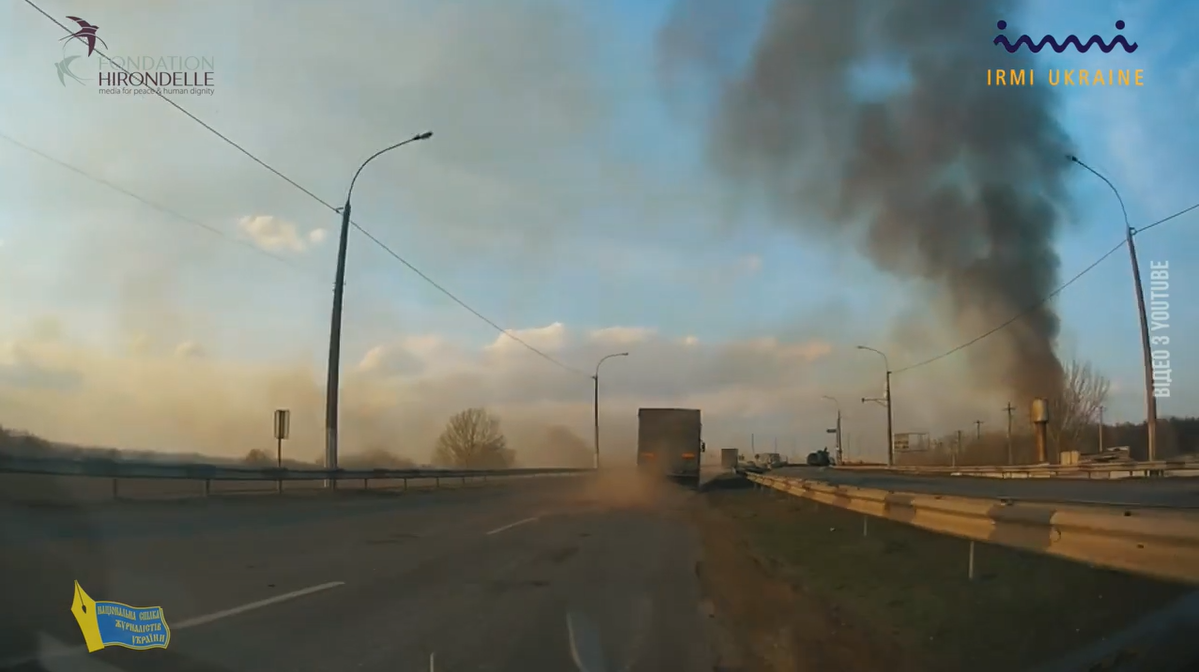
Lina Kushch talks about the indomitability of our local newspapers and the special journalistic and civic responsibility to the reader in the conditions of close hostilities:
“We often see how the media, which were hyperlocal, with a team of two or three people, continue their work, gathering information in the zone of hostilities, a few kilometers away from the Russian border.
We see how local newspapers, which previously had a circulation of literally a couple of thousand copies, how important they are becoming for their community and for those people who otherwise cannot get information.
People want to read from Ukrainian sources, to read about themselves. And we help our colleagues launch such projects.”
To prove the above Lina Kushch‘s words, executive secretary of the Chernihiv regional organization of the NUJU, Olha Cherniakova, said:
“Our journalists themselves discovered the inner reserves of some necessity, desperation, and courage. And everyone forgot that they had a family, thinking of being alone. They ran to where it was the hottest. The war and this aggravation made it possible to speak, to call things by their names.”
Ievheniya Virlych, the editor-in-chief of the Kavun.City website, which used her media to inform the general public about the events in the occupied Kherson Region, proudly notes:
“It was extremely difficult to save myself, really just save myself physically… I was perturbed about my colleagues, and, to my great happiness, very few of my colleagues went to collaborate with the enemy.”
Like a big exclamation mark, like an axiom, the film ends with a chorus of voices: JOURNALISTS ARE IMPORTANT! Ukrainian journalists confidently prove it with every day of the year of indomitability.
The material was prepared by the NUJU with the support of the Swiss non-profit organization Foundation Hirondelle and the Institute for Regional Media and Information (IRMI, Ukraine) within the framework of the project Increasing the Ukrainian media sustainability, financed by Swiss Solidarity.
Olha Voitsekhivska, Journalist of Ukraine

 THE NATIONAL UNION OF
JOURNALISTS OF UKRAINE
THE NATIONAL UNION OF
JOURNALISTS OF UKRAINE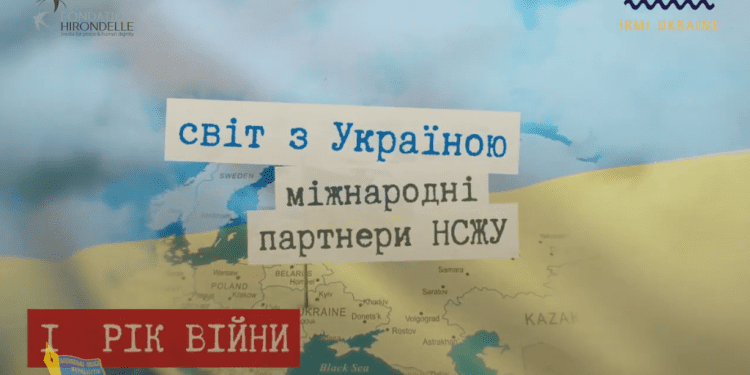
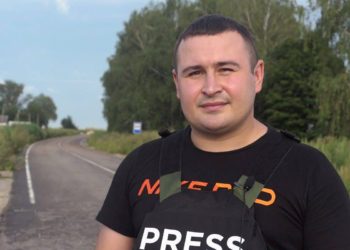
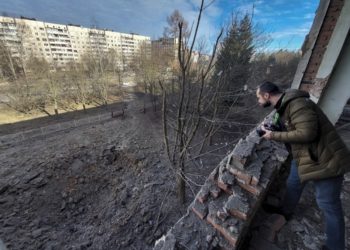
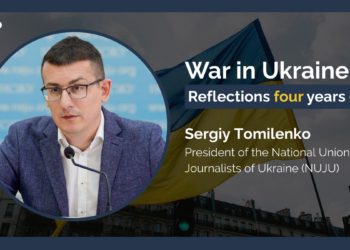













Discussion about this post